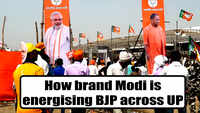Assam’s communal politics began with Ajmal: Sarma
TNN | Apr 16, 2019, 07:14 IST PM Narendra Modi and Assam finance minister Himanta Biswa Sarma at a BJP rally in Kamrup. (PTI)
PM Narendra Modi and Assam finance minister Himanta Biswa Sarma at a BJP rally in Kamrup. (PTI)KARIMGANJ: Himanta Biswa Sarma, BJP’s man in the northeast, is an ardent advocate of communal identity politics in Assam, but blames the communal nature of the electioneering as “Assam’s reaction to Muslim communalism”.
Sarma, who switched to BJP from Congress and played a significant role in bringing his party to power in Assam, has been urging voters to re-elect the Narendra Modi government to preserve the state’s ethnic, religious and national identity.
The suave and gentle Sarma, however, makes little mention of NRC or the now lapsed Citizenship Amendment Bill, which have deeply polarised the voters.
In Muslim-dominated Karimganj, Sarma claims Assam lived in the “most secular way” until 2006. The communal politics began “only after Badruddin Ajmal formed the first communal party (All India United Democratic Front) and when a section of Muslims started opposing NRC.”
The Illegal Migrants Determination by Tribunal Act of 1983 enacted by the Indira Gandhi government for Assam, which made it difficult to deport illegal immigrants, was struck down by the Supreme Court in 2005 in the Sarbananda Sonowal vs Union of India case.
“We had appealed to the Muslim community against the idea of forming Muslim exclusive political parties. Even in 2006 (when still with Congress), I said in many interviews that if Ajmal went ahead with it, then Assamese people will have to create a defence mechanism.”
Sarma says BJP started gaining ground in the state only after Ajmal communalised politics. “Today people in Assam are with BJP because they feel they need to counter his politics. It is more of a defensive reaction rather than an offensive action,” he says.
Sarma admits that Muslims will not want to vote for BJP this time.
“I believe there is goodwill but it will not translate into votes. I have found that in the elections already held in five seats, 99% of Muslims have voted for Congress. Although we worked very hard, they voted against BJP. But Hindus haven’t voted that way,” he says.
Hindus, he adds, are “more secular”, they are voting for every party. They (Muslims) still have some apprehension in their mind. But I think this is a passing phase, I do expect them to vote for the BJP in the 2021 assembly elections. There are a lot of nationalistic Muslims too,” the finance minister hopes.
On his former party, Sarma says, “I know had I stayed on with Congress, I could have been popular among the Muslims in the state. But we have to put an end to appeasement politics.”
Sarma, who switched to BJP from Congress and played a significant role in bringing his party to power in Assam, has been urging voters to re-elect the Narendra Modi government to preserve the state’s ethnic, religious and national identity.
The suave and gentle Sarma, however, makes little mention of NRC or the now lapsed Citizenship Amendment Bill, which have deeply polarised the voters.
In Muslim-dominated Karimganj, Sarma claims Assam lived in the “most secular way” until 2006. The communal politics began “only after Badruddin Ajmal formed the first communal party (All India United Democratic Front) and when a section of Muslims started opposing NRC.”
The Illegal Migrants Determination by Tribunal Act of 1983 enacted by the Indira Gandhi government for Assam, which made it difficult to deport illegal immigrants, was struck down by the Supreme Court in 2005 in the Sarbananda Sonowal vs Union of India case.
“We had appealed to the Muslim community against the idea of forming Muslim exclusive political parties. Even in 2006 (when still with Congress), I said in many interviews that if Ajmal went ahead with it, then Assamese people will have to create a defence mechanism.”
Sarma says BJP started gaining ground in the state only after Ajmal communalised politics. “Today people in Assam are with BJP because they feel they need to counter his politics. It is more of a defensive reaction rather than an offensive action,” he says.
Sarma admits that Muslims will not want to vote for BJP this time.
“I believe there is goodwill but it will not translate into votes. I have found that in the elections already held in five seats, 99% of Muslims have voted for Congress. Although we worked very hard, they voted against BJP. But Hindus haven’t voted that way,” he says.
Hindus, he adds, are “more secular”, they are voting for every party. They (Muslims) still have some apprehension in their mind. But I think this is a passing phase, I do expect them to vote for the BJP in the 2021 assembly elections. There are a lot of nationalistic Muslims too,” the finance minister hopes.
On his former party, Sarma says, “I know had I stayed on with Congress, I could have been popular among the Muslims in the state. But we have to put an end to appeasement politics.”
Download The Times of India News App for Latest India News.
Making sense of 2019
#Electionswithtimes
View Full Coverage































All Comments ()+^ Back to Top
Refrain from posting comments that are obscene, defamatory or inflammatory, and do not indulge in personal attacks, name calling or inciting hatred against any community. Help us delete comments that do not follow these guidelines by marking them offensive. Let's work together to keep the conversation civil.
HIDE